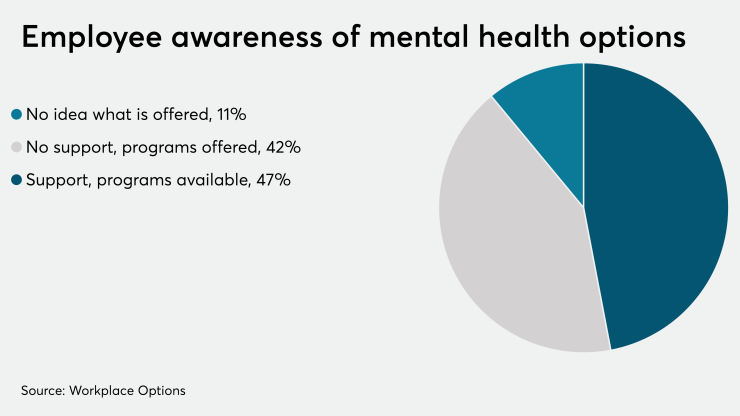By Caroline Hroncich, Walden Siew
WASHINGTON — The National Alliance of Healthcare Purchaser Coalitions introduced a five-year plan on Monday to push employers and health systems to address mental health and substance abuse issues for employees.
Michael Thompson, president and CEO of the National Alliance, said in an interview with Employee Benefit News that the new program will be a five-point, five-year plan involving various partners to focus on improving access to mental healthcare for employees across six regions in the U.S.
The crisis is being exacerbated by inadequate access to care for mental health and substance use for Americans across the country, said Thompson, noting that members of his own family have suffered from mental health issues. In the wake of the U.S. opioid crisis, rates of suicide and drug-related deaths are at record levels, he said.
The initiative includes partners from the Meadows Mental Health Policy Institute and the American Psychiatric Association Foundation’s Center for Workplace Mental Health, and will involve six regional partners expected to be announced in December, he said.
“The National Alliance has had a focus on mental health for over three years now,” he said in an interview on Monday. “It’s a crisis that's been growing and getting worse and worse and worse.”
“So why now? There's a readiness now. With our coalition three years ago, mental health actually showed up second to the bottom in terms of key issues. Today, frankly, it's at the top of everybody's list. So the awareness of the problems with access has never been as great as they are now.”
Five areas of focus will be implemented to improve access to effective detection and treatment of mental health. These best practices include efforts to:
- Improve network access for behavioral health specialists;
- Expand use of collaborative care to integrate behavioral health into primary care;
- Implement measurement-based care to improve quality and outcomes
- Expand tele-behavioral health
- Ensure mental health prioritization
“It’s not a small issue, it’s a crisis,” said Thompson, speaking earlier to members at the National Alliance’s annual forum.
The demand for mental healthcare in the U.S. is rising. More than 10 million Americans have an unmet need for mental health treatment, according to the nonprofit
Thompson also cited an Optum study that said that 86% of employers believe that access remains a key issue.
“We know that when employers, when the system is focused on total person care, we invariably save money and we always spend more on mental health. This is not about saving money on mental health. This is about improving access, improving value, improving performance on mental health, and using a disciplined process through the coalitions and engaging regional partners,” he said.
Over the last year, employers have stepped up to help address mental health and substance abuse issues among their employee populations. About 83% of employers offer mental health coverage, according to data from the Society for Human Resource Management. Some employers, including
Poor mental health has a direct impact on worker performance and is a leading factor in workers going on disability and suffering from chronic diseases. Yet the number of in-network mental health professionals on employer insurance plans is decreasing, Thompson said during the conference.
“The level of acceptance around mental health is improving, but the system is getting worse — our access to mental health professionals, psychiatrists and others is getting worse,” he said. “Providers are leaving the system, they are retiring from the system and the new providers are coming in and are being told to practice out of network.”
The alliance’s new initiative will focus on improving several aspects of mental healthcare including network access, measurement-based care, behavioral telehealth and mental health parity compliance. The initiative will also encourage collaboration between primary care physicians and mental health professionals, Thompson said.
This is a very personal issue for many, including Thompson, whose brother died of suicide. The initiative will allow the alliance to learn from lessons at employers across the country.
“I am very passionate about mental health in part because I have a family history with mental health,” Thompson said. “It’s really, really personal for probably a high percentage of people in this room. I’m just telling you, it’s important and we’re going to do something about it.”






